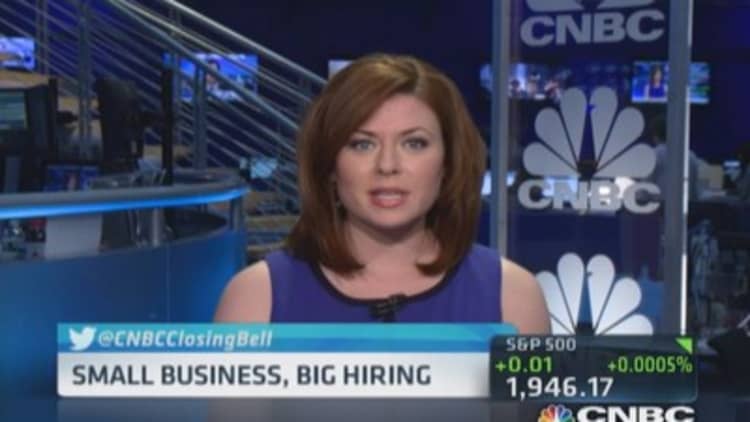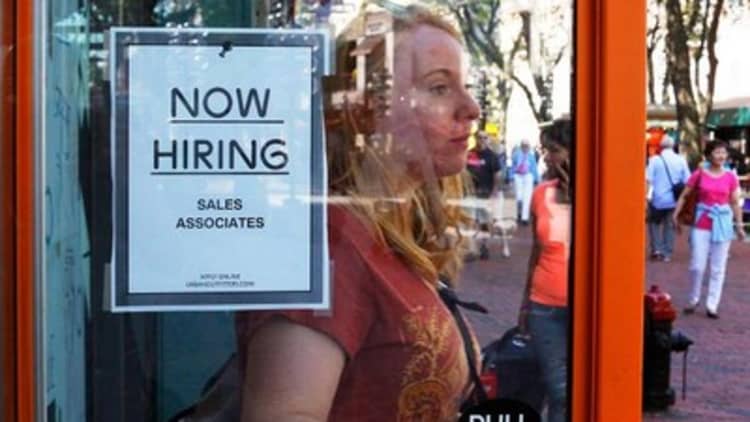
Offering signs of hope the economic recovery is solidifying, new data shows a more optimistic Main Street that plans to boost wages and raise prices.
More small- and mid-sized U.S. business owners plan to raise salaries, according to the fall PNC Economic Outlook Survey findings, released Thursday. About 38 percent of business owners surveyed said they expect to increase employee compensation in the next six months—the most since 2008, when the financial crisis struck.
While the unemployment rate fell in August to 6.1 percent, according to the U.S. Labor Department, wage gains for the most part have not been widespread.
"Wage growth has been a missing piece of the labor market puzzle to date," said PNC's Chief Economist Stuart Hoffman, in a prepared statement.
The survey also found 38 percent of business owners surveyed plan to hike prices during the next year. While some of that strategy can be attributed to hedging against anticipated higher costs that include health care, the price hike is also about optimism.
"Some of this is health-care cost related, but they also feel business is improving," Hoffman told CNBC. "They are also planning on pay raises, so their labor costs will also go up."
In addition to cost pressures, Hoffman said small companies overall feel demand and the economy are improving, so they can afford to raise prices without losing business, Hoffman said.
About 20 percent of small-business owners plan to add full-time employees, according to the PNC survey. That's down slightly from 22 percent six months ago, but up from 16 percent this time last year.
Uneven recovery
Of course one new survey doesn't make a trend. Other economic data has shown small business in fact is hiring—but that longer term prospects remain murky.
Read MoreWhy Main Street isn't creating jobs
Private payrolls rose roughly in line with expectations in September, due to growth in small business and the service sector hiring, according to the latest ADP report. A separate jobs report from the government is due out Friday.
Looking ahead though, few small businesses think now is the time to expand, and hiring was essentially flat for the 11th straight month in August, according to a small-business optimism index from the National Federation of Independent Business.
"Reports of past hiring were very strong, suggesting a good jobs number, but job openings and job creation plans faded, casting a shadow over the job market outcomes," said William Dunkelberg, NFIB's chief economist, in a prepared statement.

The start-up factor
Looking at the community of small companies broadly, the PNC survey and a separate digest released last week from the Kauffman Foundation emphasizes the particular role young companies play in the economy.
The Kauffman Foundation, which focuses on entrepreneurship, found the age of a business is more important than size, and that newer firms help to spur the most job growth. New companies account for nearly all net new job creation and almost 20 percent of gross job creation, according to Kauffman.
Unlike younger businesses that are focused on growth and innovation, older companies generally can be focused on cost savings and pocketing value—not necessarily creating jobs.
"If you are an entrepreneur with an idea of a product you want to bring to market, you need other people to help you do that," said Jason Wiens, policy director for the Kauffman Foundation. "You are looking for product designers, marketers and more, whereas older companies have either reached the point where they will not grow much longer, or they are trying to get as much value out of the company as possible if they have shareholders," he said.
The Kauffman report also found start-ups help to generate more competition and innovation. What's more, between 1988 and 2011, companies that were more than five years old destroyed more jobs than they created in all but eight of those 23 years.
Read MoreWhy resilient Americans still believe in Main Street
Of course being unemployed can spark start-up creation, a trend sometimes called necessity entrepreneurship.
"Post-recession, you can start the company you always talked about—it's a lot less scary when you don't have a nine-to-five job," says Molly Day, a spokeswoman for the National Small Business Association.


